Meet One of Our Global Heath Fellows: Elizabeth Sanseau, MD, MS
Published on
Published on
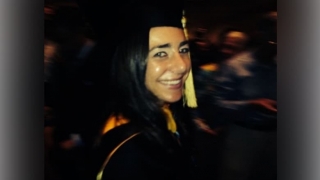 Dr. Elizabeth Sanseau at her medical school graduation in San Francisco, CA in 2014
Elizabeth Sanseau, MD, MS, grew up in California and completed her undergraduate degree at Columbia University. She earned her medical degree and a master’s degree in health and medical sciences from the UC Berkeley-UCSF Joint Medical Program, where she participated in the Program in Medical Education for the Urban Underserved. She is currently completing a fellowship in pediatric emergency medicine and global health at CHOP.
Dr. Elizabeth Sanseau at her medical school graduation in San Francisco, CA in 2014
Elizabeth Sanseau, MD, MS, grew up in California and completed her undergraduate degree at Columbia University. She earned her medical degree and a master’s degree in health and medical sciences from the UC Berkeley-UCSF Joint Medical Program, where she participated in the Program in Medical Education for the Urban Underserved. She is currently completing a fellowship in pediatric emergency medicine and global health at CHOP.
Dr. Sanseau recently answered a few questions about her training, her interest in global health, and her experience as a fellow at CHOP.
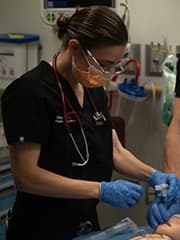 Dr. Sanseau during the production of a simulation video for open access medical education
During college, I knew I wanted to be a physician like my late father was. I was also drawn to the humanities, specifically art history and Italian, so I took the opportunity to study abroad at the University of Bologna in Italy. After graduating from college, I returned to Italy and worked for the Patrons of the Arts of the Vatican Museums. After my time in Rome, I bid the Pope arrivederci and returned to the States to pursue a career in medicine, which had always been my dream.
Dr. Sanseau during the production of a simulation video for open access medical education
During college, I knew I wanted to be a physician like my late father was. I was also drawn to the humanities, specifically art history and Italian, so I took the opportunity to study abroad at the University of Bologna in Italy. After graduating from college, I returned to Italy and worked for the Patrons of the Arts of the Vatican Museums. After my time in Rome, I bid the Pope arrivederci and returned to the States to pursue a career in medicine, which had always been my dream.
While completing my postbaccalaureate premedical studies, the opportunity arose to volunteer with a group of public health physicians in rural El Salvador. I volunteered to help with a pediatric oral health initiative through the Asociación Salvadoreña Pro-Salud Rural (ASAPROSAR) in Santa Ana. This turned into a three-summer commitment that sparked my interest in global health, specifically working with community health aides or promotoras. After that, I selected medical training programs with a strong focus on mentorship and support for students interested in working with underserved communities locally and internationally.
My master’s thesis was focused on adolescent obesity in Oakland, Calif., through the lens of the community-based participatory research method of videovoice. I then selected another “program within a program” for my pediatric residency: the University of Washington Seattle Children’s Hospital-Alaska Track. This offered me the opportunity to move from an urban setting to a rural one, where I worked closely with community health aides throughout my three years of residency in bush Alaska (i.e., any region of the state that is not connected to the North American road network or that does not have ready access to the state’s ferry system). This experience solidified my desire to work with providers who are the first to assess and manage an ill pediatric patient in the most remote locations in the world.
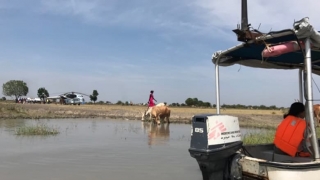 Dr. Sanseau on a boat in Old Fangak, South Sudan, 2018
The people, patients, healthcare delivery system, geography and adventure of Alaska were so captivating that I stayed on for another two years after residency to work full-time as a pediatric hospitalist at the Yukon-Kuskokwim Health Corporation in Bethel, Alaska. In this role, I traveled among the 58 Native villages in Southwest Alaska practicing broad-spectrum pediatrics, including inpatient, outpatient, emergency, transport and telemedicine. During this time, I was also able to pursue international work volunteering as a clinician working for the locally founded nongovernmental organization South Sudan Medical Relief, alongside Médecins Sans Frontières in Old Fangak, South Sudan.
Dr. Sanseau on a boat in Old Fangak, South Sudan, 2018
The people, patients, healthcare delivery system, geography and adventure of Alaska were so captivating that I stayed on for another two years after residency to work full-time as a pediatric hospitalist at the Yukon-Kuskokwim Health Corporation in Bethel, Alaska. In this role, I traveled among the 58 Native villages in Southwest Alaska practicing broad-spectrum pediatrics, including inpatient, outpatient, emergency, transport and telemedicine. During this time, I was also able to pursue international work volunteering as a clinician working for the locally founded nongovernmental organization South Sudan Medical Relief, alongside Médecins Sans Frontières in Old Fangak, South Sudan.
My professional goal is to improve pediatric emergency response and the management of critically ill pediatric patients in remote and resource-limited settings. I am passionate about hands-on work with patients and the development and implementation of innovative systems for the education and empowerment of healthcare workers in the field who first respond to an ill patient.
I have approached my medical education with a broader perspective of the biological, social, ethical and behavioral aspects of health and human disease. I feel that my role as a pediatrician is not only as a clinician but also as an educator, researcher and patient advocate. I aspire to reduce health disparities throughout the world as a pediatric emergency medicine physician and improve sick children’s care upstream by advancing training for prehospital and frontline emergency first responders.
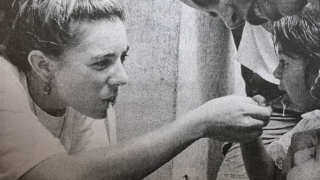 Dr. Sanseau participating in an oral health training in Santa Ana, El Salvador in 2006
My experiences in the volcanic regions of El Salvador, bush Alaska and South Sudan inspired me to return to training to expand my knowledge and skills. That’s why I decided to pursue fellowship training in pediatric emergency medicine and global health at CHOP. As a fellow, I have helped develop a simulation-based educational curriculum on pediatric emergencies that can be facilitated both in person and remotely via telesimulation. This telesimulation platform was recently adapted for use with Médecins Sans Frontières, the Pediatric Simulation Training and Research Society, the Indian Health Service and the Improving Pediatric Acute Care Through Simulation groups demonstrating effectiveness, acceptance and feasibility. As a physician-educator, I expect to continue remote and in-person teaching of frontline providers via such innovative methods. I hope to expand these simulations throughout the world in remote and resource-limited settings to teach pediatric and nonpediatric providers how to approach pediatric emergencies such as shock, dehydration, dengue hemorrhagic fever and severe malaria efficiently and effectively to reduce morbidity and mortality.
Dr. Sanseau participating in an oral health training in Santa Ana, El Salvador in 2006
My experiences in the volcanic regions of El Salvador, bush Alaska and South Sudan inspired me to return to training to expand my knowledge and skills. That’s why I decided to pursue fellowship training in pediatric emergency medicine and global health at CHOP. As a fellow, I have helped develop a simulation-based educational curriculum on pediatric emergencies that can be facilitated both in person and remotely via telesimulation. This telesimulation platform was recently adapted for use with Médecins Sans Frontières, the Pediatric Simulation Training and Research Society, the Indian Health Service and the Improving Pediatric Acute Care Through Simulation groups demonstrating effectiveness, acceptance and feasibility. As a physician-educator, I expect to continue remote and in-person teaching of frontline providers via such innovative methods. I hope to expand these simulations throughout the world in remote and resource-limited settings to teach pediatric and nonpediatric providers how to approach pediatric emergencies such as shock, dehydration, dengue hemorrhagic fever and severe malaria efficiently and effectively to reduce morbidity and mortality.
Upon completion of my fellowship in pediatric emergency medicine and global health in 2023, I plan to work with providers who are first responders to ill pediatric patients in remote and low-resource settings throughout the world to improve their readiness to respond to emergencies.
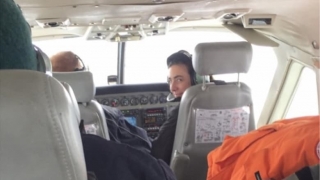 Dr. Sanseau with colleagues during a LifeMed medevac transport call in Bethel, Alaska, 2017
Every single day! I look forward to each shift in the CHOP Emergency Department. I love the teamwork, the intensity, the anticipation of the unexpected, and the privilege of being in a role where I can support an anxious patient or parent during a crisis in their lives.
Dr. Sanseau with colleagues during a LifeMed medevac transport call in Bethel, Alaska, 2017
Every single day! I look forward to each shift in the CHOP Emergency Department. I love the teamwork, the intensity, the anticipation of the unexpected, and the privilege of being in a role where I can support an anxious patient or parent during a crisis in their lives.
My nonclinical focus on creating and facilitating simulation-based education for community providers is incredibly rewarding. I communicate regularly with educators and learners across time zones designing educational interventions for their unique settings. I thrive during these interactions because I love meeting new people who are working in distinct work environments, and I learn a great deal from my colleagues in each setting.
Be humble and fierce in the pursuit of what you want to do. Do not give up. Once you find your passion, go for it! Say yes to opportunities where you get to learn from the patients you want to serve and the providers who have dedicated their lives to this work before you. When working in new local and international environments, recognize your role as a privileged guest with a lot to learn. With time, dedication, demonstrated commitment and an open heart, you will learn how to truly listen to and earn the trust of your patients and colleagues.
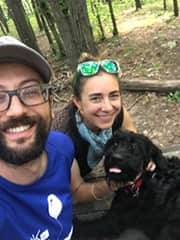 Dr. Sanseau with her husband Zeus and dog Fragola
I recognize how amazing my job is. I am being trained by world leaders in pediatric emergency medicine and global health here at CHOP and I am growing every day. This feeling of growth is infectious and rejuvenating. I know the skills I’m mastering as a fellow will help me better serve my patients and colleagues in the future. At the end of each day, when I’m tired, I run my energetic dog in the park and eat a warm Italian meal prepared by my incredible, brilliant and supportive husband. I’m one lucky lady, and I know it. Taking care of myself is important so I can think clearly and creatively about how to be a better clinician, educator, researcher and patient advocate.
Dr. Sanseau with her husband Zeus and dog Fragola
I recognize how amazing my job is. I am being trained by world leaders in pediatric emergency medicine and global health here at CHOP and I am growing every day. This feeling of growth is infectious and rejuvenating. I know the skills I’m mastering as a fellow will help me better serve my patients and colleagues in the future. At the end of each day, when I’m tired, I run my energetic dog in the park and eat a warm Italian meal prepared by my incredible, brilliant and supportive husband. I’m one lucky lady, and I know it. Taking care of myself is important so I can think clearly and creatively about how to be a better clinician, educator, researcher and patient advocate.